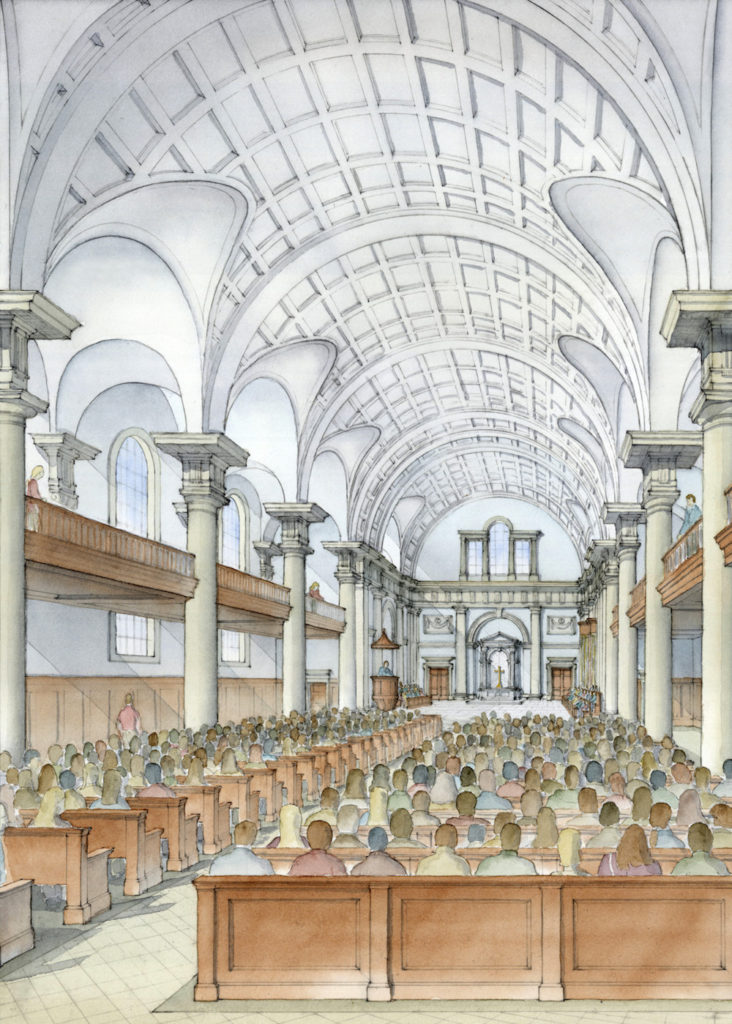
Christ Chapel will be the newest chapter in Hillsdale College’s long affiliation with Christianity.
Provost David Whalen told The Collegian earlier this semester the college has always been Christian and the purpose of the chapel is to “make explicit what is too often implicit.”
A group of Free Will Baptists established the college in 1844, because they wanted to create a place for the education of the clergy. The college dropped this affiliation in 1918, because of tension with the denomination over the college’s acceptance of black students. The college switched to an American Baptist affiliation but eventually dropped all sectarian ties in 1962, after a lack of financial support from Baptist churches. The administration attempted to keep the disassociation covert, however, and did not allow The Collegian to report on it at the time, according to a 2001 Collegian article.
In 1964, the college also ended mandatory chapel attendance. The earliest available record from 1856 says students were required to attend chapel every day of the week and twice on Sunday, but over the years, that requirement lessened as student attendance waned, eventually decreasing from five or six days a week, to four, to three, to two, and then finally to twice a month.
Although a few students suggested positive reasons for mandatory chapel attendance in early Collegian issues, several students published more critical or satirical pieces, arguing the chapel was unnecessary and had become a place only for sleep or last-minute studying.
“I heartily believe chapel should be abolished,” student Robert Patneau ’37 told The Collegian in 1934. “I would rather use my time for breakfast.”
Associate Professor of History Darryl Hart said at many colleges, such as Yale and Harvard universities, where the administration changed chapel attendance from a mandatory to voluntary activity, religion has often returned later as an academic discipline.
Hart said it would not be unusual for a college to reaffirm its ties to Christianity through a particular denomination, but Hillsdale’s case is unusual since it is nonsectarian.
“I think Hillsdale is going in some very uncharted waters,” Hart said. “That may be dangerous, or that may be an easy sail. I don’t know.”
College archivist Linda Moore said although the college did receive funding from the Free Will Baptist denomination during its affiliation, students did not have to prove affiliation with the denomination to attend.
Educating the clergy was a common goal of many colleges during the 19th century, Hart said, and Hillsdale’s curriculum included Latin and Greek, specifically to help students fulfill the requirements for becoming ministers. Nevertheless, students were not required to become ministers, Gilbert said, and the degrees varied from business, to engineering, to politics, to many others.
“From the beginning, the college had a lot of religious goals,” Gilbert said. “As time went by, they added lots of things, but the college remains loyal to the original idea. It has a moral basis, which runs back to the original years of the college.”
Thomas Burke, dean of humanities and the philosophy and religion department chairman, said to him, the chapel reaffirms the college’s religious heritage and its founding not only as a liberal arts college but also to promote Christianity.
“One of the discussions in Western thought is the relationship of faith and reason, and Christianity, in part, is a pursuit of that discussion,” he said. “We sometimes forget how thoroughly imbued Western ideas are with theological ideas. To me, the chapel simply represents the fact that we take our Christian heritage as seriously as we do our intellectual heritage.”

